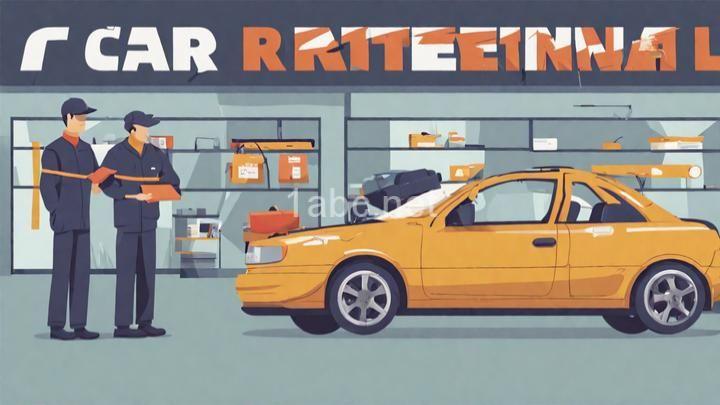Save Money on Your Next Rental: Mastering Fuel Policies
Introduction:
I. Understanding Different Fuel Policy Options
1. Full-to-Full Policy:
2. Prepaid Fuel:
3. Partial Refund Policies:
II. Choosing the Right Fuel Policy for You
1. Distance of Travel:
2. Availability of Gas Stations Near Drop-Off Location:
3. Personal Convenience:
III. Mastering the Full-to-Full Policy
1. Research Nearby Gas Stations Before Returning the Vehicle:
2. Plan Refueling Stops Strategically During Your Trip:
IV. Making Prepaid Fuel Work for You
1. Limited Access to Gas Stations During Your Trip:
2. Uncertainty about Local Fuel Prices or Currency Conversions:
V. Maximizing Savings with Partial Refund Policies
1. Calculate Your Estimated Fuel Consumption:
VI. Additional Tips for Saving Money on Fuel Charges
1. Fill up Just Before Returning the Rental Car:
2. Use Smartphone Apps to Find Cheaper Gas Stations:
3. Avoid Unnecessary Fuel Charges by Returning the Vehicle on Time:
Conclusion:

Introduction:
Hello there, fellow travelers! Are you planning your next adventure and want to save some money along the way? Look no further! In this blog post, we will explore the world of fuel policies when renting a car and how they can significantly impact your costs. By understanding the different fuel policy options and choosing the right one for you, you can master the art of saving money on your next rental. So, buckle up and let's dive in!
I. Understanding Different Fuel Policy Options
When renting a car, it's essential to familiarize yourself with the various fuel policy options available. The most common types include the full-to-full policy, prepaid fuel, and partial refund policies. Let's take a closer look at each one:
1. Full-to-Full Policy:
The full-to-full policy is perhaps the most widely used fuel policy. With this policy, you receive the rental car with a full tank of gas and are expected to return it in the same condition. This means that you pay for the fuel you use during your rental period. It's a straightforward policy that allows you to control your fuel expenses.
2. Prepaid Fuel:
Prepaid fuel policies involve paying for a full tank of gas upfront at a fixed rate set by the rental company. This option is ideal for individuals who want to avoid the hassle of refueling before returning the vehicle or who anticipate limited access to gas stations during their trip. However, it's crucial to calculate your estimated fuel consumption carefully to ensure you don't end up overpaying.
3. Partial Refund Policies:
Partial refund policies require you to pay for a full tank of gas at the beginning of your rental. However, you will receive a refund for any unused fuel upon returning the car. This policy is advantageous if you anticipate not using the entire tank of gas, as it allows you to save money by only paying for what you use.
II. Choosing the Right Fuel Policy for You
Now that we've explored the different fuel policy options, how do you choose the right one for your needs? Consider the following factors when making your decision:
1. Distance of Travel:
If you plan on covering long distances during your rental period, the full-to-full policy may be the most cost-effective option. It allows you to refill the tank as needed, ensuring you only pay for the fuel you consume.
2. Availability of Gas Stations Near Drop-Off Location:
If you're returning the car in an area with limited access to gas stations, the prepaid fuel policy might be a good choice. This way, you won't have to worry about finding a station at the last minute or potentially paying higher prices due to scarcity.
3. Personal Convenience:
Consider your personal preferences and convenience when selecting a fuel policy. If you don't mind stopping to refuel before returning the car, the full-to-full policy may suit you best. On the other hand, if you prefer a hassle-free experience, prepaid fuel or partial refund policies might be more suitable.
To determine the most appropriate fuel policy for your needs, take into account the factors mentioned above. It's essential to strike a balance between cost savings and convenience.
III. Mastering the Full-to-Full Policy
The full-to-full policy is a popular choice due to its simplicity and potential for saving money. Here are some strategies to ensure you return the rental car with a full tank:
1. Research Nearby Gas Stations Before Returning the Vehicle:
Before your rental period ends, take the time to research gas stations in the vicinity of your drop-off location. This way, you can plan your route accordingly and avoid any last-minute fueling stress.
2. Plan Refueling Stops Strategically During Your Trip:
If you're embarking on a road trip, plan your refueling stops strategically. Take advantage of cheaper fuel prices by filling up in areas where gas costs less. Additionally, consider refueling when your tank is still half full to avoid any potential surcharges for returning the car with less gas than you received it.
IV. Making Prepaid Fuel Work for You
If you anticipate limited access to gas stations during your trip or prefer the convenience of not having to refuel before returning the car, prepaid fuel may be the right option for you. Here are a few tips to make prepaid fuel work in your favor:
1. Limited Access to Gas Stations During Your Trip:
If you're traveling to a remote area where gas stations are sparse, prepaid fuel provides peace of mind. You won't have to worry about running out of gas or paying inflated prices in areas with limited competition.
2. Uncertainty about Local Fuel Prices or Currency Conversions:
Traveling to a foreign country? Prepaid fuel eliminates any uncertainty about local fuel prices or currency conversions. You can budget your expenses more accurately, knowing that your fuel costs are already taken care of.
V. Maximizing Savings with Partial Refund Policies
Partial refund policies offer the best of both worlds by allowing you to pay upfront for a tank of gas while receiving a refund for any unused fuel. Here's how you can maximize your savings with this policy:
1. Calculate Your Estimated Fuel Consumption:
Before renting the car, calculate your estimated fuel consumption based on your travel plans. By having a rough idea of how much gas you'll need, you can avoid overpaying. Remember, you'll only receive a refund for the fuel you don't use, so it's essential to be as accurate as possible.
VI. Additional Tips for Saving Money on Fuel Charges
Regardless of the fuel policy you choose, there are general tips you can follow to save money on fuel charges. Consider the following:
1. Fill up Just Before Returning the Rental Car:
Even with a full-to-full policy, it's wise to fill up the tank just before returning the car. This way, you can ensure it's topped off and avoid any potential surcharges for returning the vehicle without a full tank.
2. Use Smartphone Apps to Find Cheaper Gas Stations:
Make use of smartphone apps that help you find nearby gas stations and compare fuel prices. By locating cheaper options, you can save money on each refueling stop.
3. Avoid Unnecessary Fuel Charges by Returning the Vehicle on Time:
Returning the rental car late may result in additional charges, including fuel fees. To avoid unnecessary expenses, make sure you adhere to the agreed-upon drop-off time.
Conclusion:
Congratulations! You are now armed with all the knowledge you need to save money on your next car rental by mastering fuel policies. By understanding the different options available, considering your personal needs, and implementing the strategies we've discussed, you can take control of your fuel expenses and make the most of your travel budget. So, go ahead and start planning your next adventure with confidence. And remember, if you have any money-saving tips of your own, we'd love to hear about them in the comments below. Safe travels and happy saving!
FREQUENTLY ASKED QUESTIONS
What is Save Money on Your Next Rental: Mastering Fuel Policies all about?
"Save Money on Your Next Rental: Mastering Fuel Policies" is an informative guide that provides tips and strategies for saving money on fuel expenses when renting a vehicle. It covers various fuel policies offered by rental companies and explains how each policy works. The guide also provides practical advice on selecting the most cost-effective fuel policy based on individual needs and preferences. By mastering fuel policies, readers can optimize their rental experience and save money on their next car rental.
Are fuel policies different for every rental company?
Yes, fuel policies can vary among different rental companies. Some companies may provide a full tank of fuel at the start of the rental and require you to return the vehicle with a full tank. Others may provide a full tank and charge you for the fuel used, or they might ask you to pay for a full tank at the time of rental and allow you to return the vehicle with any amount of fuel remaining. It is important to carefully read and understand the fuel policy of the specific rental company you are considering to avoid any surprises or additional charges.
How do fuel policies affect the overall cost of a rental?
Fuel policies can have a significant impact on the overall cost of a rental. Here are three common fuel policies and how they can affect your expenses:
- Full-to-Full Policy: Under this policy, you receive the rental car with a full tank of fuel and are expected to return it with a full tank as well. This policy is generally the most cost-effective option since you only pay for the fuel you actually use. Make sure to refill the tank before returning the car to avoid additional fees.
- Pre-Purchase Fuel Policy: With this policy, you pay for a full tank of fuel in advance at a set price when picking up the rental car. You can return the car with any amount of fuel, but you will not receive any refund for unused fuel. This policy can be convenient if you predict using a significant amount of fuel, but it may not be cost-effective if you don't use the full tank.
- Full-to-Empty Policy: Also known as "pay in advance," with this policy, you pay for a full tank of fuel in advance and return the car empty. The rental company usually charges a higher fuel price than the local market rate and you won't receive any refund for unused fuel. This policy can be expensive if you don't use the entire tank of fuel.
It's important to carefully consider the fuel policy when renting a car to avoid any unnecessary costs. Always read the rental terms and conditions to understand the specific fuel policy and make an informed decision based on your travel plans and expected fuel usage.
How can I determine which fuel policy is the best for me?
Determining the best fuel policy for you depends on your specific needs and preferences. Here are a few factors to consider:
- Cost: Compare the prices of different fuel policies (e.g., full-to-full, pre-purchase, or pay-on-return) and calculate which option would be the most cost-effective based on the average fuel prices and your estimated usage.
- Convenience: Think about your travel plans and how you prefer to manage refueling. Full-to-full policies may be more convenient if you prefer to control the amount of fuel in the tank, while pre-purchase policies eliminate the need to find a gas station before returning the vehicle.
- Flexibility: Consider how flexible you want to be with your travel plans. Some fuel policies may require you to prepay for a full tank, which can be restrictive if you don't plan on using all the fuel.
- Rental Duration: If you're renting a car for a short period, full-to-full policies may be preferable, as you're less likely to require multiple refuelings. For longer rentals, pre-purchase policies might be more convenient.
- Trip Itinerary: Evaluate your trip itinerary and calculate the approximate distance you'll be traveling. This will help you estimate the amount of fuel you'll need and assess which fuel policy aligns best with your travel plans.
Ultimately, the best fuel policy for you will depend on your priorities and the specific circumstances of your trip. Consider these factors and choose the option that suits your needs and preferences the most.
How can I estimate the fuel cost for my rental?
To estimate the fuel cost for your rental, you can follow these steps:
- Determine the estimated distance you will be driving during your rental period.
- Check the fuel efficiency (miles per gallon) of the rental vehicle. This information is usually provided by the rental company or can be found in the vehicle's manual.
- Divide the estimated distance by the vehicle's fuel efficiency to get an estimate of the fuel consumption in gallons.
- Multiply the estimated fuel consumption by the average price of fuel per gallon in your area to get an estimate of the fuel cost.
Keep in mind that fuel prices can vary, so it's a good idea to check the current fuel price before calculating the final estimate.
How can understanding fuel policies help me save money on my rental?
Understanding fuel policies can help you save money on your rental in the following ways:
- Full-to-full policy: With this policy, you receive the car with a full tank of fuel and are required to return it with a full tank. By adhering to this policy, you can avoid additional charges for fuel that the rental company may impose if you return the car with less fuel than initially provided. This way, you only pay for the fuel you actually use, potentially saving you money.
- Pre-purchase fuel option: Some rental companies offer the option to pre-purchase a full tank of fuel at a discounted rate. If you plan on using a significant amount of fuel during your rental period, this can be a cost-effective option. However, make sure you will be able to use up the full tank before returning the car, as there are usually no refunds for unused fuel.
- Bring your own fuel: If the rental company allows it, you can save money by filling up the tank at a nearby gas station before returning the car. This way, you can typically find cheaper fuel prices outside of rental company premises, saving you money compared to their fuel rates.
By familiarizing yourself with the fuel policies of your rental company and planning accordingly, you can optimize your fuel usage and potentially reduce your overall rental expenses.
How can I estimate my fuel usage to determine which fuel policy is best for me?
To estimate your fuel usage and determine the best fuel policy for you, you can follow these steps:
- Calculate your average annual mileage: Begin by estimating how many miles you typically drive in a year. This can be based on your daily commute, occasional road trips, and any other driving you do regularly.
- Determine your vehicle's average fuel efficiency: Refer to your vehicle's user manual, manufacturer's website, or search online for the average fuel efficiency (in miles per gallon or liters per kilometer) of your specific make and model. If you have owned the vehicle for a while and have a record of fuel consumption, you can calculate an average by dividing the total distance traveled by the total fuel consumed.
- Calculate your annual fuel consumption: Multiply your average annual mileage by your vehicle's average fuel efficiency to estimate how many gallons or liters of fuel you would use in a year.
- Research fuel prices: Look up the current fuel prices in your area for the type of fuel your vehicle uses (gasoline, diesel, etc.). You can check local gas stations or online fuel price comparison tools to get an accurate estimate.
- Compare fuel policies: Determine the available fuel policies offered by your local gas stations or fuel providers. These may include options such as pay-as-you-go (no prepayment), prepayment for a specific amount, or memberships and discounts.
- Calculate costs for different fuel policies: Based on your estimated annual fuel consumption and the current fuel prices, calculate the projected cost for each fuel policy option. Consider any additional benefits or discounts provided by each policy when making your comparison.
- Analyze and choose the best fuel policy: Review the estimated costs and any other factors that are important to you, such as convenience or rewards programs. Select the fuel policy option that best suits your needs and offers the most cost-effective solution based on your estimated fuel usage.
Keep in mind that actual fuel consumption can vary due to factors such as driving habits, road conditions, and vehicle maintenance. Therefore, your estimated fuel usage may not be entirely accurate, but it should give you a good approximation for determining the best fuel policy.




